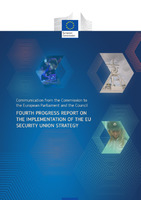Communication on the Fourth Progress report on the implementation of the EU Security Union Strategy

doc com
Συγγραφέας
European Commission
Ημερομηνία
2022-05-25Θεματικές επικεφαλίδες
EU Health security ; Cybersecurity ; Criminal and terrorist activity ; Vigilance and coordinationΠερίληψη
The Russian war of aggression against Ukraine dominates today’s EU security agenda. The
war not only threatens Ukraine, but seeks to damage global stability and security. Inside the
EU, it brings a range of risks to the security of citizens. There are new uncertainties over
supplies of energy and other raw materials, and critical infrastructure may be targeted in
cyberattacks. EU internal safety and security are jeopardised by potential attacks or accidents
resulting from chemical, biological, radiological or chemical agents in the war zone. The
vulnerabilities of millions of people who have fled the war can be quickly exploited by
organised crime, through trafficking of women and children, who are particularly at risk.
In the face of these new and potential threats, the EU has remained resolute and united. While
the impact of the war has so far remained principally limited to the territory of Ukraine, the
EU has stepped up vigilance and coordination with increased monitoring of the threat
landscape, and has worked to strengthen resilience to ensure preparedness.
In the Versailles Declaration of 10-11 March 20221, European leaders stressed the need to
prepare for fast-emerging challenges, including by “protecting ourselves against ever-
growing hybrid warfare, strengthening our cyber-resilience, protecting our infrastructure –
particularly our critical infrastructure – and fighting disinformation”.
The Security Union framework is central to ensuring security across the EU. The four
strategic priorities set out in the Security Union Strategy2 remain directly relevant to this task
in the current geopolitical context: (i) a future proof security environment; (ii) tackling
evolving threats; (iii) protecting Europeans from terrorism and organised crime; and (iv) a
strong European security ecosystem. The war has underlined the need for the EU and its
Member States to make full use of legislative and policy instruments already available under
the Security Union Strategy, which underpin coordinated EU support to Member States on
issues from organised crime and terrorism, to cybersecurity and hybrid threats.
The European agencies in the area of Justice and Home Affairs have also stepped up their
efforts in response to the war in Ukraine, playing a key role in assessing threats and in
supporting operational responses3. Continuous strengthening of the Schengen area’s
operational practice and governance is another important factor.
This fourth Security Union progress report focuses on the developments over the past few
months since the Russian war of aggression against of Ukraine. It provides an overview of
actions taken on all Security Union strands and considers the preparedness needs arising from
potential security threats stemming from the war in Ukraine. Progress on other Security
Union files can be found in annex
